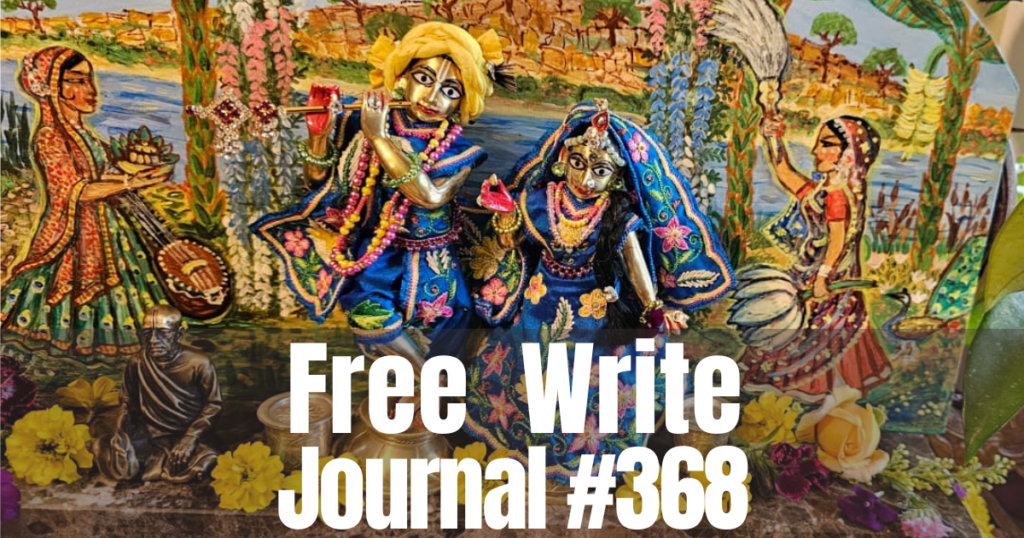
We need to expand our team of proofreaders as we aim to increase the rate of republication of Satsvarūpa Mahārāja’s books as well as new books that he writes.
This includes a need for fluent bilingual Spanish and English speakers to proofread Spanish translations (we currently have around 20 Spanish translations waiting to be proofread).
Anyone interested in this particular service should contact Manohara dāsa at [email protected]
If you would like to help, please contact Kṛṣṇa-bhajana dāsa at [email protected] or [email protected] and we will find you a service that utilizes your talents.
Now it’s turning toward late afternoon and you didn’t do splendidly, but you were putting more things aside in order to chant. After all, this is a chanting vrata. Other things will take care of themselves later—answering letters and speaking lectures. Now plod on, stagger on, run blindly careening into buildings and not doing it right, but reeling on incoherently, poorly pronounced, everything wrong but somehow going right also. Hare Krsna Hare Krsna, Krsna Krsna Hare Hare/Hare Rama Hare Rama, Rama Rama Hare Hare
******
“The words should be chanted with clear utterance, and the whole body should be concentrated on the chanting. We can’t expect to do other things while chanting Hare Krsna.” (JRN, p. 33)
Don’t brag here or anywhere. Be lowly. You are lowly. Don’t say, “I chanted one round surprisingly fast, and on another round I found myself deeply concentrating and praying—this is how we should do it.” Then what shall I write in a diary on japa?
******
I am happy I am spending time chanting. I won’t give up; I want to encourage myself and fan the spark of utkantha. I want to let myself flame up. Protect the japa solitude. Pray to Lord Nrsimha for protection. Pray to Lord Nityananda.
It is expected that I will enter an improved state of consciousness by so much association with the holy name. Don’t forget those who want to chant, who have vowed to chant but whose duties prevent them. Give them more hope in this diary. Give them a hint that we really have to give our time to harer nama.
******
Srila Prabhupada says, “The process of Krsna consciousness should be very vigorously propagated all over the world. . . . (Teachings of Queen Kunti, pp. 136-37).
“Contributing or distributing the holy name of the Lord is a sublime example of contributing or giving charity (the dadati principle).” (Nectar of Instruction, text 4, purport)
Tell everyone to chant Hare Krsna
******
All praises to the guru of the holy name, Srila Prabhupada. I am thankful for his constant, strong emphasis on harer nama, which gives us conviction that this simple process is most important. All glories to the Vedic scriptures which tell us that Kali-yuga is so unfortunate as to be a “sea of vices,” and yet there is one great quality (mahad-guna) in this age—the chanting of the names of Krsna. That great quality makes the age of hypocrisy auspicious.
“My dear King, although Kali-yuga is full of faults, there is still one good quality about this age. It is that simply by chanting the Hare Krsna maha-mantra, one can become free from material bondage and be promoted to the transcendental kingdom.” (Bhag. 12.3.51, cited C.c., Madhya 20.344)
******
“Just always chant Hare Krsna. Never mind whether you are in a factory or in hell, in a shack or in a skyscraper—it doesn’t matter. Just go on chanting Hare Krsna Hare Krsna, Krsna Krsna Hare Hare/Hare Rama Hare Rama, Rama Rama Hare Hare. There is no expense, there is no impediment, there is no caste, there is no creed, there is no color—anyone can do it. Just chant and hear” (On the Way to Krsna, p. 69).
******
In verses nine and ten of Manah-siksa, Raghunatha dasa Gosvami pours out nectar to his mind. He orders his brother mind to always remain absorbed in Lord Krsna, “the most beloved of my worshipable mistress, Srimati Radharani.” He orders his mind to absorb himself in Srimati Lalita-devi, Srimati Visakha-devi, Radha-kunda, and Govardhana Hill. He further orders his mind to worship Srimati Radharani, who has “cast a spell on Lord Krsna and brought Him under Her control . . . She is the most beloved of the Lord’s girlfriends.”
******
Bhaktivinoda Thakura’s purports to these verses consist almost entirely of slokas from Rupa Gosvami, Raghunatha dasa Gosvami, and others, glorifying Srimati Radharani, the Yamuna, and so on. Bhaktivinoda Thakura advises a greedy disciple to approach a guru on the raganuga platform to find out his eternal relationship with the Lord.
All this is possible, to begin with, only if one possesses guileless humility, intense greed and undeviating resolve for executing devotional service.” (Manah-siksa, p. 50)
******
I have been making a few comments on the verses of Manah-siksa as part of my meditation on japa so that I could instruct my own mind. But in these later verses, Raghunatha dasa Gosvami has gone far beyond my capabilities. Can I, in good conscience, advise my mind to plunge into meditation on Srimati Radharani and Her entourage? But if I don’t do this, then what will I meditate on?
I have thought about this many times already. I always come up either with a theoretical resolution or no conclusion. The theoretical resolution is that I should try to link attentive chanting with meditation on the pastimes of Radha and Krsna. Even at my stage I can do this by reading rasika material between rounds and by deliberately thinking about Their pastimes. I am following this proposal, although it remains theoretical. My only problem is that my mind is still filled with other thoughts. This is my misfortune, the result of my misspent youth and of many misspent lifetimes.
pp. 10-14
nārada uvāca
pārāśarya mahā-bhāga
bhavataḥ kaccid ātmanā
parituṣyati śārīra
ātmā mānasa eva vāAddressing Vyāsadeva, the son of Parāśara, Nārada inquired: Are you satisfied by identifying with the body or the mind as objects of self-realization?
Srila Narada addresses Vyasadeva as maha-bhaga, greatly fortunate, yet his question is frank: Are you transcendentally situated? Srila Prabhupada writes that this is Narada’s hint about the cause of Vyasadeva’s despondency. Vyasadeva has great parentage—his father is the great Parasara Muni. Therefore, he should not be deluded. If we are raised in Krsna consciousness, we should be able to overcome illusion and understand the causes of unhappiness. An ordinary person might identify with the body and mind, but not someone elevated like Vyasa.
Srila Prabhupada’s last sentence is a classic: “One cannot be cheerful by nature unless one is factually seated in self-realization, which is transcendental to the material body and mind.”
We all know about glad-handers, or superficially cheerful persons. They are not jolly according to Prabhupada’s definition. It is encouraging to know that a transcendentalist does not have to hate the world; he is not a negative person who punishes himself (images of self-flagellating ascetics come to mind) for his sins. A Krsna conscious person is satisfied, at ease, smiling. If we are morose, we are not Krsna conscious.
Self-realization brings happiness because misery stems from the ignorance of identifying the self with the body. The bodily condition in the material world is just the opposite of the spiritual condition. Spiritual existence is sat-cid-ananda, and matter is asat, acit, and nirananda. When a transcendentalist can actually say aham brahmasmi with realization, he feels real happiness. Aham brahmasmi is nothing more than understanding our own eternality. Since such self-understanding brings relief from the fear of death, it’s natural that it manifests in steady cheerfulness. Then we can tolerate material tribulations even while in this body because we know we are situated on the path of perfection.
According to Narada Muni, a self-realized person never becomes baffled or despondent. A self-realized person trusts only in Krsna’s love for him; he knows he will soon be delivered by Krsna’s mercy. Krsna assures the devotee of this truth in Bhagavad-gita:
But those who worship Me, giving up all their activities unto Me and being devoted to Me without deviation, engaged in devotional service and always meditating upon Me, having fixed their minds upon Me, O son of Prtha—for them I am the swift deliverer from the ocean of birth and death. (Bg. 12.6-7)
Therefore, Narada’s question is direct. He does not compromise the principles of self-realization. His words carry deep meaning. His question reminds me of Srila Prabhupada’s preaching, especially to those who claimed to be teachers, political leaders, scholars, or religionists. Did they know their ABCs? Did they understand that they were not the body?
By reading this verse we can affirm that Prabhupada’s emphasis on our understanding aham brahmasmi is not a particular predilection of his, nor was it a shortcoming that he repeated this teaching so often. His emphasis has its roots at the beginning of our disciplic succession. Prabhupada tailored the message for the modern day, but he spoke the eternal parampara.
Nowadays, we hear even some of Prabhupada’s own followers accuse him of not speaking the “higher topics.” Prabhupada was convinced that there were no higher topics until his disciples and followers had mastered the ABCs. We saw that especially with guests. A guest would try to jump past Prabhupada’s elementary presentation and try to ask questions about Krsna, but Srila Prabhupada would say, “Don’t talk about Krsna. Krsna is millions of miles away. First we have to understand, ‘Who am I? Am I this body, am I this mind, or am I something else?”
Sanatana Gosvami also asked this question when he first approached Lord Caitanya: “Who am I and why do the material miseries give me trouble?” If one does not understand that he is not this body, then he has to seek the help of a spiritual master. Sanatana Gosvami said, “People praise me as a scholar, but I don’t even know who I am. Please instruct me.” One who has accepted a spiritual master should not fail to identify the atma. Otherwise, he will never be satisfied “by identifying with the body or the mind as objects of self-realization.” A disciple must live up to such a heritage.
By calling Vyasa the son of Parasara, Narada implies that one who comes in such a lineage should not fall into gross error on the most preliminary instruction in spiritual life. Of course, anyone can fall into forgetfulness because the material world is so contaminating, especially in Kali-yuga. Again, taking the assistance of a spiritual master is essential. It is not expected that Srila Prabhupada’s followers will identify with the body and mind. We too are in a great line.
At this stage of the discussion we may note the similarity between Narada speaking to Vyasa and Krsna speaking to Arjuna. In both cases the guru smiled, then quickly became grave. Both gurus referred to the disciples’ parentage and reprimanded them for harboring a basic misunderstanding:
While speaking learned words, you are mourning for what is not worthy of grief. Those who are wise lament neither for the living nor for the dead. (Bg. 2.11)
All disciples are in a similar position when they approach a spiritual master. Disciples are praiseworthy in that they are seeking the Absolute Truth, but to the degree to which they are unsuccessful in fulfilling their quest, they are also foolish. Our failure to find the Absolute Truth is based on our identification with body and mind, and our lack of understanding that we are Krsna’s eternal servants. Only the spiritual master can help us. Anyone now living in this material world who thinks himself above the need for guru is proud and therefore doubly foolish. Disciples should always be prepared to have their faults exposed by their spiritual master. Such care shown by the spiritual master is the life of a disciple. If we don’t admit that we don’t know Krsna, and if we don’t open ourselves to instruction from higher authorities, we will always remain dissatisfied, lost to our attachments.
Okay,
I’m not my body
I am not my body
and I am foolish because I still don’t
believe it. Not really.
Foolish.
I admit it. I’m attached. I like to be warm at night and warm in the day, and I prefer to keep my belly full rather than empty. I’m not advanced. When I speak of higher subjects, I am speaking only theory and I lack basic realization.
The very first step in self-realization is realizing one’s identity as separate from the body. ‘I am not this body but am spirit soul’ is an essential realization for anyone who wants to transcend death and enter into the spiritual world beyond. It is not simply a matter of saying ‘I am not this body,’ but of actually realizing it. This is not as simple as it may seem at first. (Beyond Birth and Death, p. 1)
Then what else is there to say and pray? I can make further confessions, but that doesn’t seem to be the point right now. Are you satisfied to think that you are this body?
Narada is sarcastic, as Krsna was with Arjuna. “Oh? You say you are a learned man, but you are lamenting for that which is not worthy of grief.”
I make claims to identity—artist, writer, sannyasi, man—but I don’t know who I am. I say I will learn writing from other writers, but what can they know if they are identifying themselves with body and mind?
O Narada, you hit so hard. Please let me follow you without compromise. You assure us that Krsna is the final goal and that we should love Him without selfishness. You awaken us to this goal.
But still we dream from our contaminated minds. Taints remain. We live alone or with others, but the defect does not wash clean. What will it take? I write letters to others, I preach the realization, I expose my defect and the defects in others, I take a walk. Lack of knowledge turns to fear.
pp. 181-85
Don’t live for even one day in a place that doesn’t have these five: a moneylender, a learned brahmana, a king, a river, and a doctor.
In his writing and talks referring to this verse, Prabhupada concentrated only on the river, the friend, the Deity and the dhama. In modern society, people favor great cities for their amenities, but don’t usually look for the ones mentioned here. Srila Prabhupada said,
Cities and towns does not mean big, big slaughterhouse, cinema, brothel, and factories and all dirty things. This is not mentioned. Here Kuntidevi says, ime jana-padāḥ svṛddhāḥ supakvauṣadhi-vīrudhaḥ. She never said, “These towns and cities are flourishing on account of having so many industries, slaughterhouses, brothels, cinema, clubs, night-clubs.” Not like that. There was no such thing in those days. These are modern inventions to make the whole world hellish. (Lecture, SB 1.8.40, 10/20/74)
Srila Prabhupada often spoke of the importance of rivers, both materially and spiritually, and how he personally witnessed that almost all the world’s rivers had become polluted.
They cannot keep clean because they have got so many dirty activities, enterprises, mills and factories. In Calcutta also. There are so many jute mills and factories on the riverside. All the night soil is thrown into the Ganges. But still the Ganges is so powerful that it keeps clear. Hundreds and thousands of people still take bath in the Ganges and they keep very good health.
Prabhupada also praised the idyllic village life in India where people live on the bank of a river and bathe in it, consider it holy, and use it as transportation.
In the last few years, a controversy has arisen about the actual safety of bathing in the Ganges and the Yamuna. Sometimes devotees feel their faith tested as to whether they should bathe for spiritual purification or avoid it for health reasons. Those who are raising the controversy are scientists and environmentalists, and my response to them is that if the river is so dirty that it shouldn’t be bathed in, then they should clean it. Everyone should take it seriously that such a sacred river has been polluted by the jute mills or other factories.
We have even heard reports that the government may be building factories along the river banks on purpose to discourage religion. Whether this is true or not, I don’t know, but it wouldn’t be so strange that atheists and secularists were purposely polluting a sacred river.
Whoever has a feeling for Vedic culture should clean the rivers. There has already been some work done in this regard, although the effort is almost fruitless in relation to the amount of dirt and contamination being pumped into them.
Beyond that, devotees can have faith that the river maintains its spiritual identity, regardless of how it is desecrated. To continue bathing in the river does take faith. It is similar to having faith in the pure nature of prasadam. Acting without faith may cause us to get sick, even if we have an objective understanding of the river (or the prasadam’s purity). If devotees find that they cannot enter the river, they should at least honor the river by taking water on their heads. Those who are more daring will swim in it and chant Hare Krsna.
According to the Indian system, when one tours or travels, he always visits temples and rivers. The two go together. Almost all the holy places in India are on the banks of the Ganges, Yamuna, or other sacred rivers. If one is serious about human life, then his friends also live in holy places on the riversides. One travels to see them and to share spiritual life, not to associate with nondevotees and nasty places.
Krsna conscious preachers may travel and reside anywhere in the world, even where there is no river or even before a temple is established in the town. Srila Bhaktisiddhanta Sarasvati Thakura was more interested in sending devotees to big cities like Bombay, rather than sending them to ideal places in the countryside. The devotee, therefore, lives in unattractive places out of compassion. He wants to tend to the spiritual needs of the congested population. In this way, a devotee may see the crowded city life as favorable—for preaching.
Srila Prabhupada himself set this example. He left the Radha-Damodara temple in Vrndavana, which is situated on the bank of the Yamuna and surrounded by the best friends, the Vrajavasis. He went alone to America, where the rivers, city life, and people were all contaminated. By his compassionate example, we are now able to understand higher values and to seek out residence in a temple, to take advantage of the holy rivers, and to know who are our true friends in Krsna consciousness.
A river is holy because Krsna or an incarnation of Visnu had pastimes there. For example, Krsna played in the Yamuna with the cowherd boys and the gopis. Lord Caitanya played and bathed in the Ganges and in other sacred rivers in India. Now that the Krsna consciousness movement has spread all over the world, can devotees have spiritual feelings toward any Western rivers? Can the rivers that have had some significance in ISKCON’s activities be considered holy? For example, the Tuscarora creek near Gita-nagari has been the scene of many devotees’ meditations and has also watered Damodara’s cows. Is it sentimental to think of this creek as holy?
I don’t think we can equate the Tuscarora creek with the Yamuna River, where Krsna actually walked and performed His pastimes, and where devotees have performed their bhajana for thousands of years. When the Krsna consciousness movement goes on and on through thousands of years, as we hope it will in this material world, then perhaps devotees will be performing bhajana on the banks of the Tuscarora creek for thousands of years and it may become more spiritual. Prabhupada did say, however, that New Vrndavan was as good as Vrndavana. Then he said, “Actually it is better because there are no Mayavadis living there.”
pp. 63-66
I am the voice
of giving up unwanted things.
I don’t think it is wise
to retain them.
They lead to repeated birth and death.
I grace the soul
so he can live without them.
I am the fire of knowledge;
when ignited by the spiritual master,
I set ablaze
all karmas,
turning them to ashes.
I destroy the bad habits and doubts.
He no longer goes to a restaurant
to taste meat or onions;
nor does he care to smoke
or drink coffee or tea.
He avoids sex entirely.
He is not interested
in wasting his time
speculating or gambling
this is anartha-nivrtti.
We can immediately become
great souls
by surrendering to Krsna,
but because we have doubts
whether or not
Krsna is actually the supreme
we have to take time
to dissipate the doubts
through the study of scripture.
I am the fire of knowledge;
when ignited by the spiritual master,
I set ablaze
all ignorance,
turn them to ashes;
No more unwanted things.
Because he was His pure devotee,
when he talked about Krsna
the words were potent and
entered my heart. Finally, I
understood and said, “Of
all the saints
or sons of God
Krsna is unique—He
is most relishable! Is
this not true?”
“Yes,” he said, “It is so.
Not only all bliss is Krsna’s
but all strength and knowledge
all beauty and fame
as well as all wealth and renunciation.
He is called Bhagavan,
the all-opulent one.
And Krsna is the best name of God,
meaning all-attractive,
as God must be.”
When I heard He married 16,000 wives,
at first I started.
“How could it be?”
His pure devotee assured me:
“He is the Lord within the hearts
of every living being;
if He desires to come out
of the hearts of a small number
of yearning devotee-souls
and become their husband
to answer their prayers,
what is the harm
or difficulty
for God?
Krsna can do anything,
and that is the meaning of God.
They say God is all-powerful,
but when He comes
and does an act
of small indication
of His power,
the atheists disbelieve,
and say, ‘He cannot do it.’
But lifting Govardhana Hill is
nothing for God;
the showing of the whole universe
in His body
is also a minor act.
Appearing in every atom,
He is the beginning, middle, and end.
He is the taste in water,
the light of the sun and moon,
the syllable OM,
the chanting of the holy names,
of fishes the shark,
of beasts the lion—
and all these are fragments of His splendor.”
Gradually, I began to learn
Sarvam khalv idam brahma,
Vasudevah sarvam iti.
“If after many births
as a philosopher
he finally understands
‘Krsna is everything’—
why not do it
in one birth instead?”
Becoming always thoughtful,
while practicing bhakti,
the devotee concludes,
I don’t want to come back again
for birth and death,
suffering repeated miseries.
And with resolve,
and Krsna’s grace,
while always practicing
chanting the maha-mantra
and eating only prasadam,
all doubts
and unwanted things
diminish.
TO BE CONTINUED
pp. 107-
I burn candles every morning while I chant japa in front of my altar. One Godbrother suggested I burn ghee wicks instead since they’re more Vedic than candles. I suppose I could, but since I travel so much, candles are easier.
It was candles—skinny little birthday candles—that Srila Prabhupada gave us in the autumn of 1966. It was a surprise. I remember going to his room in the evening as usual one night; a little ceremony was in progress. On Prabhupada’s low table, which was his altar in his worship room, he directed each of us to go up and set the candle on the tabletop, which we did by first dripping a little wax onto the table and then fixing the candle into it.
When we asked Swamiji why we were performing this small ceremony, he replied simply, “To increase your devotion.” Only later did I understand that this was our first observance of Karttika. Although this ceremony is observed in beautiful and opulent ways in Vrndavana, there will never be anything as sweet as placing those birthday candles on Swamiji’s table in 1966. After we lit our candles, we sat around and watched them burn down. We joked quietly to one another that the candle represented our souls. We wanted to see whose soul would be the first to go out—”There goes mine!”—and we would laugh as a puff of smoke rose into the air.
I am writing in that same mood of watching our lives burn down day by day, mine and yours, as we try to increase our devotion. Each day during Karttika we light a fresh candle, a new wick, that gradually burns down and expires. The next day we light another. Our supply of candles is not unlimited and neither are our days. We live in this way, seeking devotion.
We sang Damodarastakam in the temple room, Madhu leading with harmonium. Radha-Govindacandra—She an innocent young girl, He Syama, the transcendental Lord.
I remember last year’s Karttika—the rapid drum beats in Vrndavana and that Hindi lady singer. The sounds floated around us in that quiet place that Bhurijana took us near the edge of Govardhana. I followed my Godbrothers. When one bowed down, I did too. When one offered dandavats while grasping a rock, I did too. I kept my distance, but I prayed, “Dear Govardhana, please make it clear to me how to surrender to Srila Prabhupada.”
I stepped on a thorn in that rarefied atmosphere. The rocks were dull gray, streaked pink-red-brown. Beads of dew sat on the grass blades. Ants crawled up my back. Mosquitoes buzzed. Sunlight, peacocks, and my Godbrother’s camera shutter clicked.
Lord Krsna played on Govardhana Hill. He lifted it into the air as a child lifts an umbrella. How to cross the barrier of time? How to keep Krsna in our hearts?
Karttika rushed up on me this year suddenly. We’re not in Vrndavana. Srila Prabhupada writes, ” . . . even such unserious persons who execute devotional service according to the regulative principles during the month of Karttika, and within the jurisdiction of Mathura in India, are very easily awarded the Lord’s personal service.” (NOD, p. 103)
Storks landing in a paradise of chimneys in Spain, the belfries of churches their favorite roosts. It’s a strange sight.
Perhaps Paris or persimmons—perhaps words—can release me from bondage.
Foolish. He tries in various swash themes, in dreams, and by exploring the six enemies of the mind to find his lost way. They are bitter enemies.
The path is sacred, the attempt noble. Surrender is best. It can be offered gradually, pursued regularly. Give up all attachment to the monkey world. So what if you get a few mosquito bites?
The world is a fearful place. My life is so sheltered in ISKCON that I see the danger only in dreams. In Vrndavana, kirtana goes on twenty-four hours a day. The sour violin notes come over the loudspeaker from the “Nitai-Gaura-Radhe-Syama” man in his dark rama. Baladeva and I joked about the Indian mode while we sat in front of Prabhupada and the bell tolled an evening hour.
Karttika is here too, the
leaves turning brilliant orange
and yellow from green
in heartland Spain.
We’re heading north.
How is this Karttika like that one
in Vraja? I have my desire
to serve Srila Prabhupada
in a deep way in his books.
“May that son of Sacimata appear
in the innermost core of your heart.”
This is life too if
I can just feel the pulse
and pray, “Hari,
Hare Krsna,
Radha-Krsna.”
I’m not eating sweets for Karttika. While eating lunch prasadam today, it occurred to me that there wouldn’t be a sweet. Perhaps I put too much of my heart into anticipating sweet foods. I could invest that same energy, that same love, into chanting the holy name.
I began to wonder, since I was denying myself sweets whether I had actually received sweets today in another way. Then I remembered Madhu singing this morning and how we offered our lamps before beautiful Radha-Govinda-candra, how They gave us Their full darsana.
An old memory. I will chant instead.
Do the dance of love, sidestepping
petty truths and concerns of the mind.
Ever so gently
push out
the thoughts of the mind
and reside in the sound of
hari-nama awhile, awhile.
There’s no other cure for
what ails me.
Please let me return
back to Godhead.
I have to die. It’s not so far away now. Better chant in that mind. I know a fellow who passed away before his thirtieth year. A young girl died smiling. It’s happening every day—bodies are being burnt at the Yamuna. I don’t mean to depress you, friend, but it’s a fact of life. On the highway, in the stack of red sindura you see in a Vrndavana market, in the spinach you buy in America. Did you notice that man’s missing teeth? Did you see that bent-over widow? Even a plump gurukula boy carries the message: death stalks us all.
pp. 437-40
Once I dropped acid in a sugar cube after hanging around for a long time with dumb immoralists Elliot and Maria. (Was that her name?) World War II refugee from Italy. I was alone in a St. George, Staten Island apartment. Reading the Mentor edition of the Isopanisad about the nonreality of the apparent reality. Felt the spin of my life with Elliot doomed. I should do the brave thing and jump out a four-story window while wearing only jockey shorts. Jump into Stygian hell. Besides, there is no difference between matter and nonmatter, it’s like poking your finger through a nonexistent wall. How could it get hurt? (Isopanisad wisdom.) A voice deep in my sternum uttered, “Do it,” and I jumped.
I smashed into the cement and broke both my heels. So much for non-matter. Tremendous pain. I felt as if I was a caveman trying to walk thousands of years ago. I shouldn’t have been walking, probably, should have just lain there. But who would come and help me? I walked around to the front and finally saw someone and asked them to help me. Told him I fell from the window. I remember I was in an ambulance, and then in a room where they were asking me questions. I seem to remember somebody saying, “Pretty bones,” and then being asked my religion. I said, “Tao.” Name of father and mother, address. And then I passed out. The next thing I knew it was morning. My imagination was working. Just before they took me into the ambulance, I thought that all the people were leaving the earth in spaceships and I was being left behind. But now I was in a hospital, and nurses moved about in white nurse clothes. I was aware that I had taken LSD and didn’t want to be caught in an illegal act.
Then nurses and a doctor came, and I told them that I was standing near the window and I lost my balance. That was published on the first page of the newspaper. Then came a doctor looking very worried. I think he looked worried because he thought he was looking at a crazy young man. He was more afraid of the craziness than the physical damage. They started wrapping me up in casts. He explained what had happened and said something to the effect that to walk I would have to go up and down like a tractor without side movement. Did he say that I would have to do that, or that there was an alternative? Now, forty years later, I’m not walking like a tractor, but I have side movement.
A few hours later my parents came in looking very worried. They had a look of worry for a crazy son. My father had already cleared everything out of my apartment, including the writing that I did each night when I came home from work. He said, “You really like this guy?” He meant my supervisor Yasomati, who was a very likable combination of a Japanese and Negro. He very much encouraged all the workers. Obviously, my father, who was a racist, didn’t like the combination of a Jap and a Black man. I just said that he was a good worker and that this was my writing. My father said that they would close the apartment and that I could live at home with them for six weeks while my heels got well.
My dad scavenged through my apartment to see what he could find. Luckily there was no marijuana there. One day he came up to give me a daily rubdown with witch hazel, which he did to relieve the sores on my back. He mentioned the subscription to a magazine. I was surprised that he didn’t reprimand me. Rather, in a roundabout way, he talked about how he was frustrated in his relationship with my mother, because of the strict code of the Catholic Church. He never liked the priests. He always thought all they were interested in was money, and then on the other side, they controlled a man’s relationship with his wife. Every year, as a naval officer, my father would go on the annual cruise. They would go for two weeks and stop for a weekend in some exotic port, often in the Caribbean, like Trinidad or Santo Domingo. During the weekend on shore, it was understood that the officers as well as the sailors would get plenty of opportunity to have “a good time.”
One day, father came up with the witch hazel rub, but in a different, stern mood. He said that they were building a new home in Avalon, a vacation home, and that I would have to pay for part of it. I couldn’t just go along for the free ride. I was taken aback but agreed that I would give a percentage of my earnings as he decided. I was kind of shocked, though, at how tough he was, and so accusative toward me as a freeloader. After all, I didn’t have to live with him at all. Neither did I have plans of living with them after I recovered from my heel injuries.
Dad made me a desk with wheels, so that I could wheel it into the other room and use it to write on. The other room used to be my sister’s bedroom. but she was married now and gone. I began to write a journal, which I called “Loose Notes,” telling about the adventures I had gone through after jumping out the window. I was doing it in an avant-garde style, and later showed it to Allen Ginsberg and Peter Orlovsky. My friend Murry Mednick went along and showed them some of his writings. Allen wrote a foreword for it but we never raised the money to publish it.
I used to sometimes listen to baseball games at night. One thing my father and I shared was that the great Los Angeles Dodgers baseball pitching star Sandy Koufax regularly lost when he came to New York City and played the New York Mets, who were perpetual losers. We really liked the idea that Sandy couldn’t beat the Mets.
One time my father carried me piggyback, taking me downstairs for some reason. At that time, in an offhand way, I mentioned to him what I really would have liked to have been in life. I said I really would have liked to have been a college professor.
He said, “Oh, that’s the end of the line.” He seemed to think that that was the worst kind of job, like a garbage collector, whereas to me, it was the really desirable vocation. It just showed what a gap there was between us.
pp. 32-36
When all the devotees from Bengal arrived
they all desired to give Lord Caitanya something to eat.
They would entrust it to Govinda and say, “Please
arrange that the Lord will surely eat this prasadam.”
Govinda would present the prasadam but the Lord
would not eat it. He would simply say, “Keep it in storage.”
Govinda kept accumulating the food and soon it filled a corner
of the room. There was enough to feed a hundred men.
All the devotees asked Govinda with great eagerness,
“Have you given Lord Caitanya the prasadam brought by me?” Govinda had to tell them
lies, therefore one day he spoke to the Lord in disappointment:
“Many respectable devotees make a great endeavor to entrust
me with food for You. You do not eat it, but they ask me
again and again. How long shall I go on cheating them?”
The Lord replied, “You should not be foolishly disappointed.
Bring all the food to Me, and you will see I can eat it.”
Govinda brought the food and named each devotee who had
given it. Within a short time Sri Caitanya Mahaprabhu
ate enough for a hundred men.
Hearing this pastime I was impressed that it was another
miracle performed by the Lord to satisfy His devotees.
I was convinced that He was God and was grateful that
He has given us the maha-mantra to chant.
I did my japa in awe and admiration.
Prabodhananda Sarasvati writes, “May my tongue
become overwhelmed by relishing the nectarean name of
Radha . . . By Srimati‘s festival of nectar
moods may one-pointed attachment manifest within
me for Her prananatha, Sri Syamasundara.”
There is no equal to the happiness experienced
by the tongue in chanting Radha‘s name.
And the Brhad-bhagavatamrta states,
“It is said that to obtain the wealth of prema
for Sri Krishna, nama-sankirtana is the best
and most powerful sadhana. Therefore devotees
of Bhagavan conclude that sankirtana is the result
of bhakti. It is manifesting the
wealth of bhagavata -prema.
Although there is such taste in His
name, that same Syamasundara becomes overwhelmed
when He tastes the name of Sri Radha.”
Radharani holds a tulasi manjari in Her
hand, as long as Krishna‘s flute. We picked
it from the tulasi plant of Kulini Mataji which
is flourishing on our front porch nourished by
morning sunlight and fertilizer. Krishna accepts
the manjari from His beloved and They kindly
emanate Their splendor on my altar.
Below Them, kneels Hanuman, whom
I pray to for longevity, reading
Sri Hanuman Chalisa daily.
Yesterday Baladeva spent two and a half hours
mowing the lawns both on Saci‘s
side and ours. He intends to do it once
more on Saturday to please Saci and Keli
on their return. He is busy lining up cooks and
arranging the schedule for Sunday‘s
Janmastami. We are hoping numbers of people
will come to celebrate. I am reading KRSNA
book in case I am called upon to speak.
I play the melody as I offer my
music-puja. It is my morning ritual
and it is pleasant to mix
music and mental worship to
Radha-Govinda. I hope They
accept the improvised sounds played
in Their honor. I am a simple,
solitary pujari worshiping in
the privacy of my room but
by the word-poem I
broadcast my love to daily
readers on the Web. I include
them in my offering to Their Lordships.
After Sri Caitanya ate all the food brought
by the devotees from Bengal, He sampled
the bags of food brought by Raghava Pandita. He
ate from them continuously throughout the year.
During the four months the devotees stayed with
Him, He would accept an invitation from a
devotee on every day. From time to time Advaita Acarya
and others would invite Him for varieties
of cooked rice and vegetables. Devotees like Vasudeva
Datta and others who were not brahmanas would
purchase costly food offered to Lord Jagannatha
and extend invitations to Sri Caitanyta Mahaprabhu. He
followed the social custom
of eating food cooked by brahmanas, but followed
the principle of accepting food from all His devotees
regardless of caste. Sivananda Sena invited the Lord
and introduced him to his eldest son Caitanya dasa.
The Lord said, ?What kind of a name have you given
him? It is difficult to understand.” Sivananda Sena
replied, “He has kept the name that appeared
to me from within.” On the day Sivananda Sena fed
the Lord, He overate and felt discomfort.
The next day Caitanya dasa extended an invitation
to the Lord. He read the Lord‘s mind and
arranged for a different kind of food. He offered yogurt,
limes, ginger, and soft cakes made of dal.
Sri Caitanya Mahaprabhu was pleased.
In this way the Lord reciprocated with His devotees for four months
and then bade them farewell. Hearing of
these affectionate dealings, one‘s heart is melted.
I chanted my japa in happiness over
the Lord‘s love for His devotees.
My mantras were smooth and attentive.
Radha-Govinda accept my humble
worship and satisfy my heart. They stand
beside each other in intimate
union. Raghunatha dasa Gosvami prays
in Vilapa Kusumanjali: “O Radhika,
I am in a helpless condition drowning in an
ocean of unhappiness. Please lift me into
the strong boat of Your mercy and give me
the shelter of Your lotus feet.” I read
the prayer with reverence and tried to
enter the mood, looking upon Radhika
and feeling my fallen position.
I have received the book inspired by
Jayadvaita Swami, Srila Prabhupada Tributes, containing
the homages of all his disciples regardless
of their position. I‘m running out of time
between Janmastami and Vyasa-Puja. I hope
I wil be able to speak at length
about him on his appearance day.
I pray to music and offer
it to the Lord. I am happy
to worship Him in this way. He is the Supreme Artist,
Flute Player and Dancer. His flute-
playing charms all the living entities,
and in particular it steals the minds of
the gopis. He dances upon the
heads of Kaliya in a graceful way.
All the residents of Vrndavana cheer
Him, and the demigods play music
with horns and beat drums to accompany His
vigorous, artistic steps. This is
my Lord Krsna, and I play music
as the background for my poem.
I hope the devotees will accept
my simple writing as sincere
expressions of devotion to their
worshipable Lord.
pp. 239-244
Srila Prabhupada is sitting on a pillow on the rough lawn. Srutakirti is reading aloud to him. Srila Prabhupada’s hand is in his beadbag. He wears a fancy cadar with a border. He looks to one side thoughtfully. His face is beautiful, although aged. This is the human beauty of a compassionate sage.
Here is Srila Prabhupada with a garland of gardenias around a black coat with big buttons. He’s wearing his swami hat against the London cold. Taking his morning walk, amused, poetic, strong-minded against the agnostics. Someone has written,
Srila Prabhupada, please keep me engaged in the service of your servants and allow me to achieve the benediction you offered a small group of conditioned souls on the day of our initiation at Bury Place temple in London in August 1971: “If you simply chant sixteen rounds a day and follow the four regulative principles, then there’s nothing that can keep you from going back to Godhead in this lifetime. And that is a fact.”
Srila Prabhupada is playing a harmonium. He looks as if he is all alone in the world. He looks down with a fond expression at the harmonium and the music it issues forth, making new praises of Lord Krsna. Srila Prabhupada is always thinking of Him and pleasing Him at every moment. His hands are delicate—the thumb of his left hand is at the edge of the harmonium and his fingers pump the bellows, while his right fingers press down the keys, the pinky extended. He’s wearing one of those old crew-neck sweaters, leaning against a fat bolster pillow, listening to the first notes …
On the facing page, “Thank you for saving me from a hellish life.”
We have been hearing more of Prabhupada’s struggle to leave India for America. It is a poignant drama: the preparation, the delay, the difficulties he had to undergo. It is particularly poignant for we who became his disciples. What if something happened to prevent him from coming to us? Or as Prabhupada always pointed out, no one expected such an old man to embark on such an enterprise. Everyone retires at that age. Krsna and Bhaktisddhanta Sarasvati Thakura could have been sufficiently pleased by the path Prabhupada had already chosen, renouncing family and social life for the full-time service of the Lord. And yet if Prabhupada hadn’t come, what would have become of us?
We heard how he wrote and struggled to get donations to publish Back to Godhead in Delhi. Then he chose to reside in a little room in the Vamsi-Gopala temple in Vrndavana. There he immerses himself in pure devotional service in the holy dhama. But he thought, “Why shouldn’t people all over the world have the peace they are actually hankering for?” He rarely received visitors, but stayed alone writing. He walked to visit the temples in the evening.
From Vrndavana he commuted to Delhi where he sought donations and distributed BTG. “They were very hard days,” Srila Prabhupada later told us. He ran out of money and had to stop printing BTG. But he went on writing.
The climax of this reading is to hear how Prabhupada took sannyasa in his sixty-third year. His spiritual master came to him in a dream, as he had come several times before. His guru maharaja beckoned to him and called, “Come, become a sannyasi.” He responded this time, for preaching. He approached his Godbrother in the Caitanya Math in Calcutta. His Godbrother said, “Join our Math and then we can decide later if you are fit.” He then turned to Bhaktiprajna-Kesava Maharaja, who encouraged him and said, “Yes, Bhaktivedanta Prabhu, you must do it.”
The sannyasa initiation took place in the Sri Kesavaji Math in Mathura. ISKCON devotees still gather there on that date and hear how Prabhupada took sannyasa. They sat before the Deities of Radha-Krsna and Lord Caitanya. Srila Prabhupada was asked to speak and he knew, although most persons present spoke Hindi, that he would have to speak in English. The Gaudiya-Patrika published an article describing the event:
Seeing his enthusiasm and ability to write articles in Hindi, English, and Bengali, Bhaktisiddhanta Sarasvati Maharaja gave him the instruction to take tridandi sannyasa. . . . In the month of Bhadra . . . Bhaktivedanta Swami at the Sri Kesavaji Gaudiya Math accepted sannyasa from the founder of the Vedanta Samiti, Bhaktiprajnana Kesava Maharaja. Seeing him accept his asrama of renunciation, seeing this pastime for accepting the renounced order of life, we have attained great affection and enthusiasm. (Srila Prabhupada-lilamrta, Vol. 1, p. 230-1)
Krsnadasa Kaviraja Gosvami writes that the mercy of the lotus feet of Lord Caitanya and His great associates, including the Six Gosvamis, is his spiritual master.
” . . . and my words are my disciples that I have made dance in various ways. Seeing the fatigue of the disciples, the spiritual master has stopped making them dance, and because that mercy no longer makes them dance, my words now sit silently. My inexperienced words do not know how to dance by themselves . . . ” (Cc. Antya, 20.147-9).
pp. 133-37
I was a Catholic as a young boy.
I recalled those devotional feelings, her sufferings
and her devotion to her holy son, Jesus.
I have long outgrown those feelings,
ever since I adopted Kṛṣṇa consciousness
almost 60 years ago.
But I remember devotion to the mother of God
And how mine was pure.
Some of it is with me still today.
It is now morphed into love for Kṛṣṇa.
The holiest saint,
she had the greatest love for God and suffered the most.
I drifted off to sleep dreaming of her,
and how she is now aligned to my memories of Rādhikā,
Rādhārāṇī.
I hope Śrīla Prabhupāda is pleased with me
for this dream,
this amalgam reverie.
I surely merged it into thoughts of the Virgin Mary,
and after a day full of headaches
I slept peacefully.
I was a holy boy when I was but a child,
and I prayed to the Virgin Mary.
Certainly those early years
were surged in childhood devotion to God.
May Mother Mary
protect me
as I wane in my close-to-death years,
and bring me close again to Jesus, her holy son,
and bring me again, surged, to the holiest motherhood
of Vraja.
Now in these last years
I need the stick of editors
to finish my lines and make
them readable.
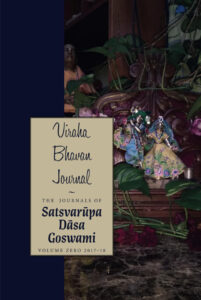
Viraha Bhavan Journal (2017–2018) was written by Satsvarūpa Mahārāja following a brief hiatus in writing activity, and was originally intended to be volume 1 in a series of published journals. However, following its completion and publication, Mahārāja again stopped writing books, subsequently focusing only on what became his current online journal, which began in August of 2018.
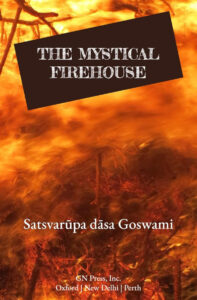
At first, I took it hard that I would have to live surrounded by the firemen, and without my own solitude. After all, for decades I had lived in my own house with my own books and my own friends. I was also now a crippled person who couldn’t walk, living among men who did active duties. But when Baladeva explained it to me, how it was not so bad living continually with other firemen and living in the firehouse with its limited facilities, I came to partially accept it and to accept the other men. I came to accept my new situation. I would live continually in the firehouse and mostly not go outside. I would not lead such a solitary life but associate with the other firemen.
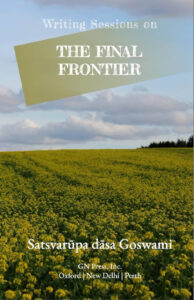
Let me write sweet prose.
Let me write not for my own benefit
but for the pleasure of Their Lordships.
Let me please Kṛṣṇa,
that’s my only wish.
May Kṛṣṇa be pleased with me,
that’s my only hope and desire.
May Kṛṣṇa give me His blessings:
Kṛṣṇa Kṛṣṇa Kṛṣṇa Kṛṣṇa Kṛṣṇa he
Rāma Rāghava Rāma Rāghava
Rāma Rāghava rakṣa mām.
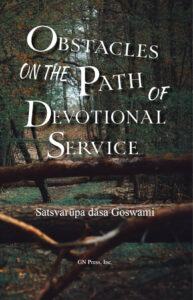
You mentioned that your pathway has become filled with stumbling blocks, but there are no stumbling blocks. I can kick out all those stumbling blocks immediately, provided you accept my guidance. With one stroke of my kick, I can kick out all stumbling blocks. —Letter by Śrīla Prabhupāda, December 9, 1972.
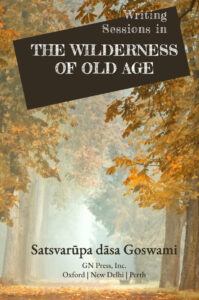
The Writing Sessions are my heart and soul. I’m trying my best to keep up with them. I am working with a few devotees, and they are far ahead of me. I wander in the wilderness of old age. I make my Writing Sessions as best I can. Every day I try to come up with a new subject. Today I am thinking of my parents. But I don’t think of them deeply. They are long gone from my life. Śrīla Prabhupāda wrote a poem when he was a sannyāsī, and he said now all my friends and relatives are gone. They are just a list of names now. I am like that too. I am a sannyāsī with a few friends. I love the books of Śrīla Prabhupāda. I try to keep up with them. I read as much as I can and then listen to his bhajanas.
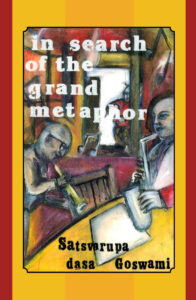
The metaphor is song. Explain it. Yes, particulars may not seem interesting or profound to readers who want structured books.
Wait a minute. Don’t pander to readers or concepts of Art. But Kṛṣṇa conscious criteria are important and must be followed. So, if your little splayed-out life-thoughts are all Kṛṣṇa conscious, then it’s no problem.
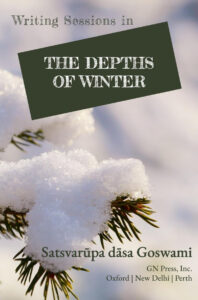
I am near the end of my days. But I do like the company of like-minded souls, especially those who are Kṛṣṇa conscious. Yes! I am prone to Kṛṣṇa consciousness. I have been a disciple of Bhaktivedanta Swami Prabhupāda for maybe almost sixty years. Sometimes I fail him. But I always bounce back and fall at his feet. It is a terrible thing that I sometimes do not have the highest love for him. It is a terrible thing. Actually, however, I never fall away from him. He always comes and catches me and brings me back to his loving arms.

This edition of Satsvarūpa dāsa Goswami’s 1996 timed book, Upstate: Room to Write, is published as part of a legacy project to restore Satsvarūpa Mahārāja’s writings to ‘in print’ status and make them globally available for current and future readers.
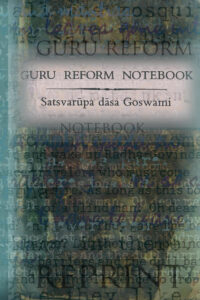
A factual record of the reform and change in ISKCON guru system of mid ’80s.
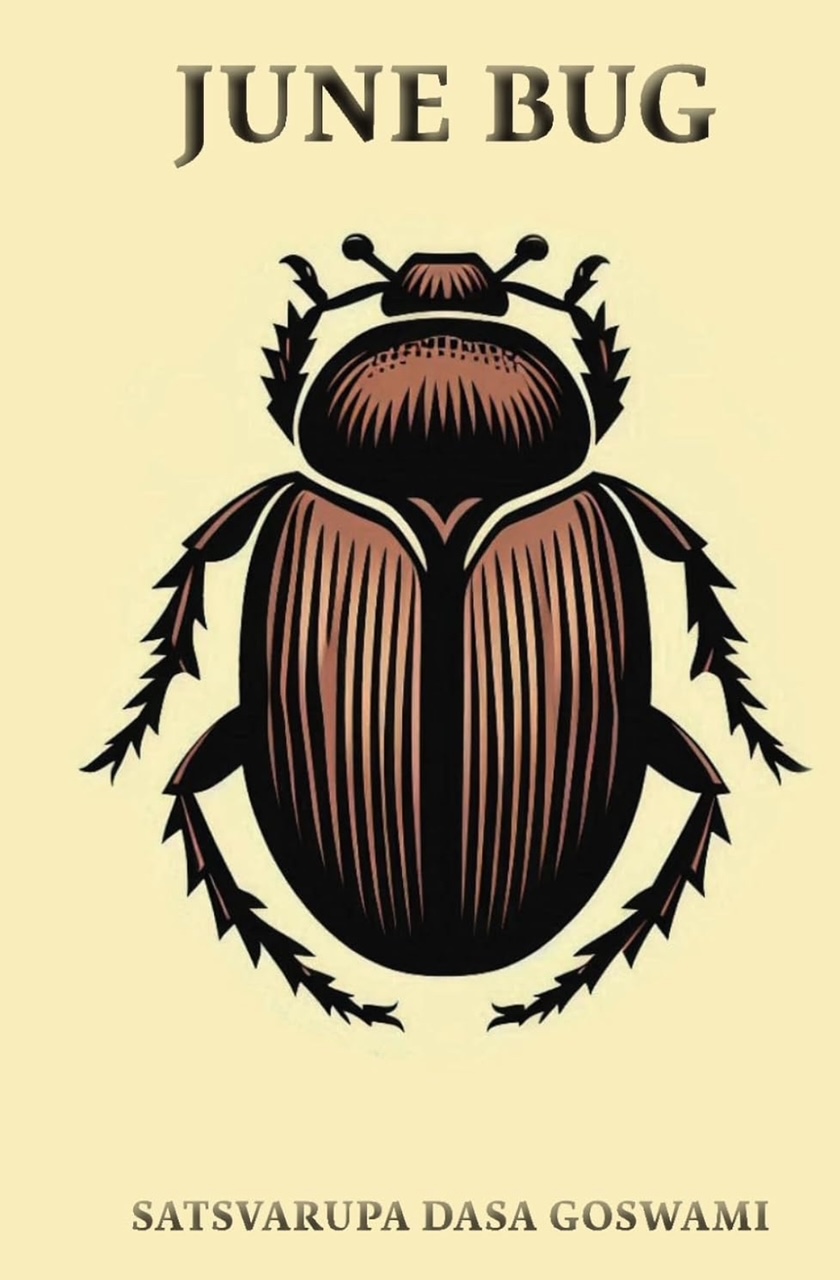
Readers will find, in the Appendix of this book, scans of a cover letter written by Satsvarūpa Mahārāja to the GN Press typist at the time, along with some of the original handwritten pages of June Bug. Together, these help to illustrate the process used by Mahārāja when writing his books during this period. These were timed books, in the sense that a distinct time period was allotted for the writing, during SDG’s travels as a visiting sannyāsī
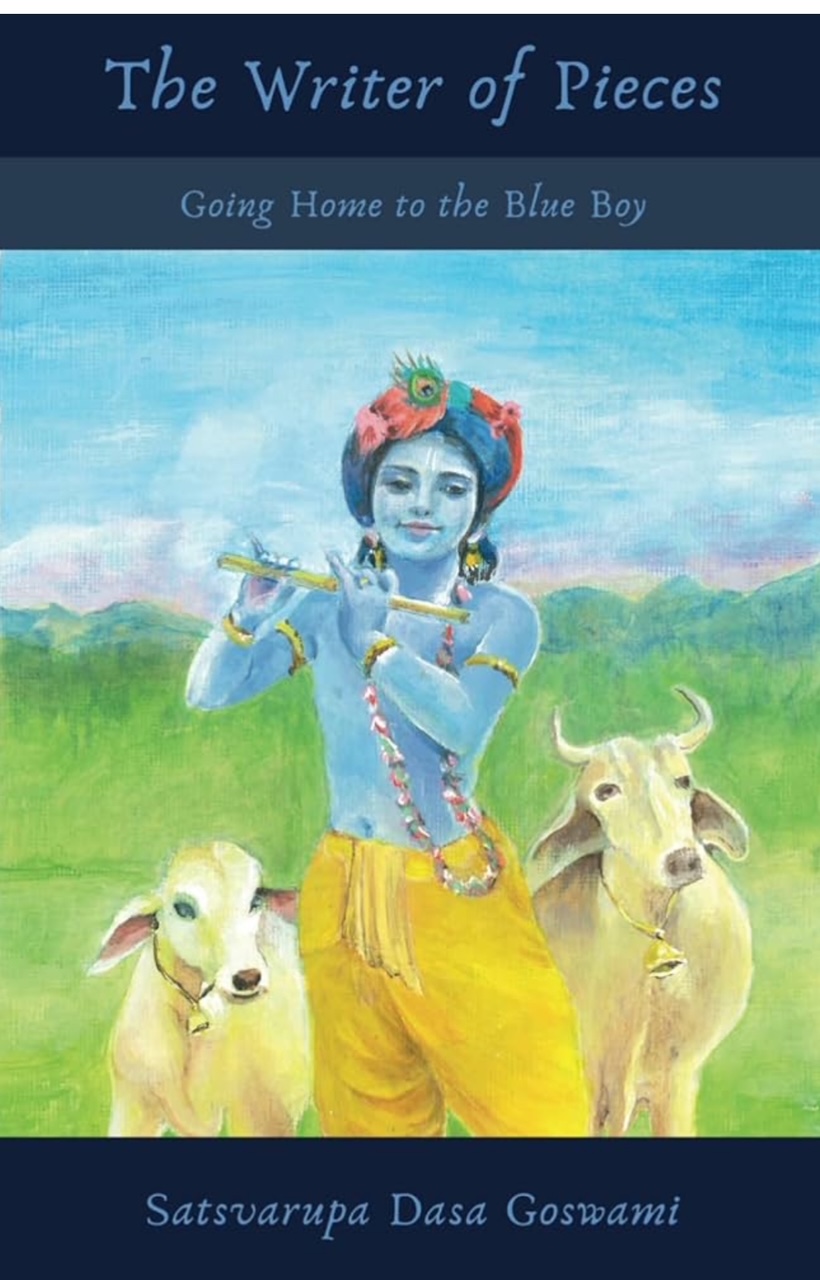
Don’t take my pieces away from me. I need them dearly. My pieces are my prayers to Kṛṣṇa. He wants me to have them, this is my way to love Him. Never take my pieces away.
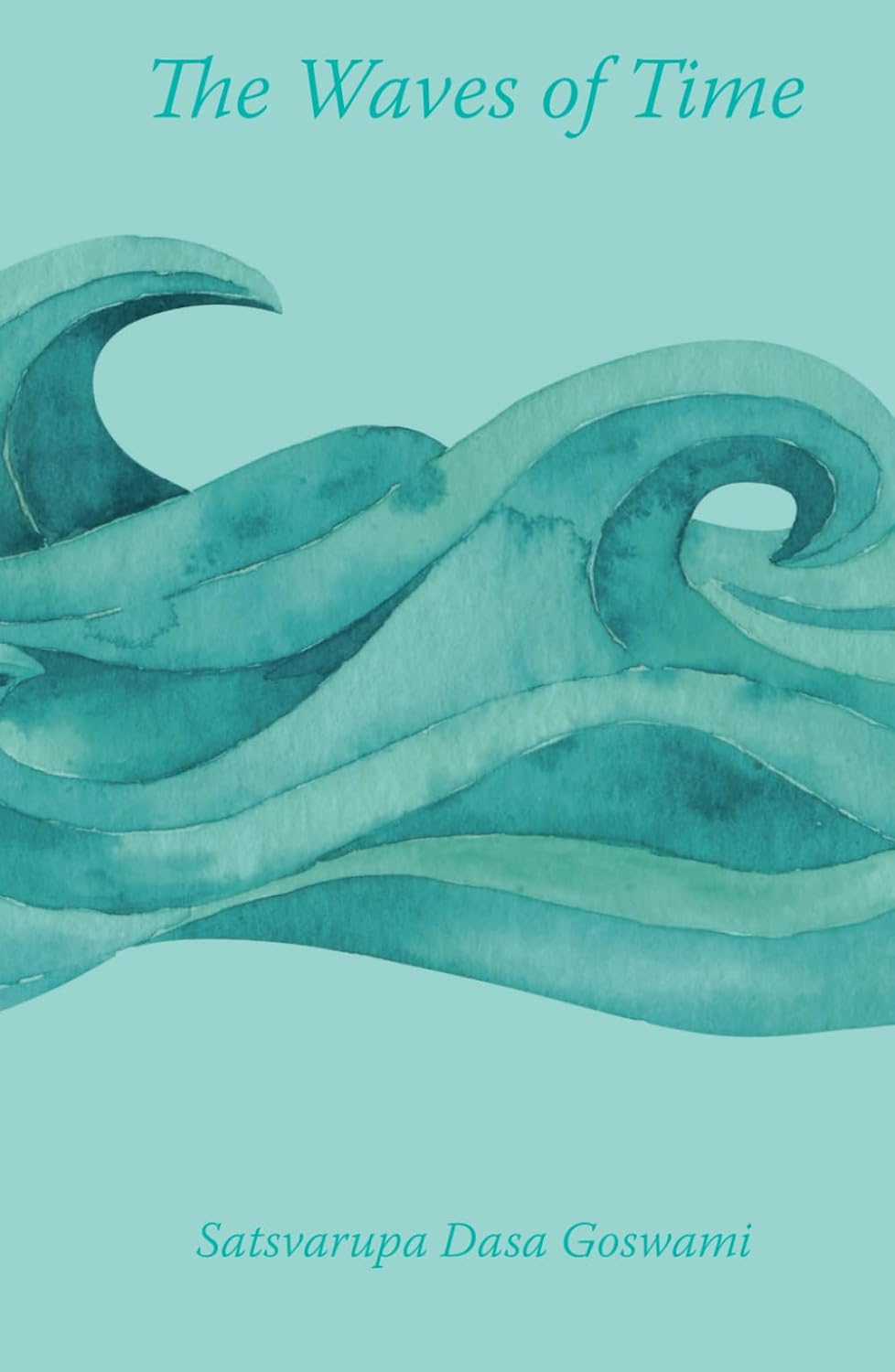
Many planks and sticks, unable to stay together, are carried away by the force of a river’s waves. Similarly, although we are intimately related with friends and family members, we are unable to stay together because of our varied past deeds and the waves of time.

To Śrīla Prabhupāda, who encouraged his devotees (including me) To write articles and books about Kṛṣṇa Consciousness.
I wrote him personally and asked if it was alright for his disciples to write books, Since he, our spiritual master, was already doing that. He wrote back and said that it was certainly alright For us to produce books.

I have a personal story to tell. It is a about a time (January–July 1974) I spent as a personal servant and secretary of my spiritual master, His Divine Grace A.C. Bhaktivedanta Swami Prabhupäda, founder-äcärya of the International Society for Krishna Consciousness. Although I have written extensively about Çréla Prabhupäda, I’ve hesitated to give this account, for fear it would expose me as a poor disciple. But now I’m going ahead, confident that the truth will purify both my readers and myself.

First published by The Gītā-nāgarī Press/GN Press in serialized form in the magazine Among Friends between 1996 and 2001, Best Use of a Bad Bargain is collected here for the first time in this new edition. This volume also contains essays written by Satsvarūpa dāsa Goswami for the occasional periodical, Hope This Meets You in Good Health, between 1994 and 2002, published by the ISKCON Health and Welfare Ministry.

This book has two purposes: to arouse our transcendental feelings of separation from a great personality, Śrīla Prabhupāda, and to encourage all sincere seekers of the Absolute Truth to go forward like an army under the banner of His Divine Grace A.C. Bhaktivedanta Swami Prabhupāda and the Kṛṣṇa consciousness movement.

A single volume collection of the Nimai novels.

Śrīla Prabhupāda was in the disciplic succession from the Brahmā-Mādhva-Gauḍīya sampradāya, the Vaiṣṇavas who advocate pure devotion to God and who understand Kṛṣṇa as the Supreme Personality of Godhead. He always described himself as simply a messenger who carried the paramparā teachings of his spiritual master and Lord Kṛṣṇa.

Dear Srila Prabhupada,
Please accept this or it’s worse than useless.
You have given me spiritual life
and so my time is yours.
You want me to be happy in Krishna consciousness
You want me to spread Krishna consciousness,

This collection of Satsvarūpa dāsa Goswami’s writings is comprised of essays that were originally published in Back to Godhead magazine between 1966 and 1978, and compiled in 1979 by Gita Nagari Press as the volume A Handbook for Kṛṣṇa Consciousness.

This second volume of Satsvarūpa dāsa Goswami’s Back to Godhead essays encompasses the last 11 years of his 20-year tenure as Editor-in-Chief of Back to Godhead magazine. The essays in this book consist mostly of SDG’s ‘Notes from the Editor’ column, which was typically featured towards the end of each issue starting in 1978 and running until Mahārāja retired from his duties as editor in 1989.

This collection of Satsvarupa dasa Goswami’s writings is comprised of essays that were originally published in Back to Godhead magazine between 1991 and 2002, picking up where Volume 2 leaves off. The volume is supplemented by essays about devotional service from issues of Satsvarupa dasa Goswami’s magazine, Among Friends, published in the 1990s.

“This is a different kind of book, written in my old age, observing Kṛṣṇa consciousness and assessing myself. I believe it fits under the category of ‘Literature in pursuance of the Vedic version.’ It is autobiography, from a Western-raised man, who has been transformed into a devotee of Kṛṣṇa by Śrīla Prabhupāda.”
 The Best I Could Do
The Best I Could DoI want to study this evolution of my art, my writing. I want to see what changed from the book In Search of the Grand Metaphor to the next book, The Last Days of the Year.
 a Hare Krishna Man
a Hare Krishna ManIt’s world enlightenment day
And devotees are giving out books
By milk of kindness, read one page
And your life can become perfect.
 Calling Out to Srila Prabhupada: Poems and Prayers
Calling Out to Srila Prabhupada: Poems and PrayersO Prabhupāda, whose purports are wonderfully clear, having been gathered from what was taught by the previous ācāryas and made all new; O Prabhupāda, who is always sober to expose the material illusion and blissful in knowledge of Kṛṣṇa, may we carefully read your Bhaktivedanta purports.

I use free-writing in my devotional service as part of my sādhana. It is a way for me to enter those realms of myself where only honesty matters; free-writing enables me to reach deeper levels of realization by my repeated attempt to “tell the truth quickly.” Free-writing takes me past polished prose. It takes me past literary effect. It takes me past the need to present something and allows me to just get down and say it. From the viewpoint of a writer, this dropping of all pretense is desirable.
 Geaglum Free Write
Geaglum Free WriteThis edition of Satsvarūpa dāsa Goswami’s 1996 timed book, Geaglum Free Write Diary, is published as part of a legacy project to restore Satsvarūpa Mahārāja’s writings to ‘in print’ status and make them globally available for current and future readers.